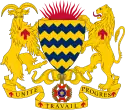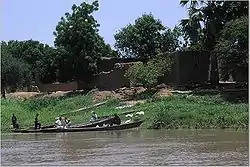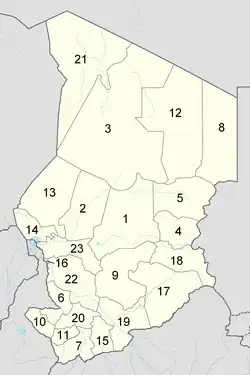Chad
Chad (French: Tchad; Arabic: تشاد, officially called the Republic of Chad), is a landlocked country in Central Africa. The capital is N'Djamena.
Republic of Chad République du Tchad جمهورية تشاد Ǧumhūriyyat Tšād | |
|---|---|
 Coat of arms
| |
| Motto: Unité, Travail, Progrès (French) Unity, Work, Progress | |
| Anthem: La Tchadienne The Chadian Hymn | |
.svg.png.webp) | |
| Capital and largest city | N'Djamena 12°06′N 16°02′E |
| Official languages | French Arabic |
| Ethnic groups (1993) | Sara 27.7% Arab 12.3% Mayo-Kebbi 11.5% Kanem-Bornou 9% Ouaddai 8.7% Hadjarai 6.7% Tandjile 6.5% Gorane 6.3% Fitri-Batha 4.7% other 6.4% unknown 0.3% |
| Demonym(s) | Chadian |
| Government | Presidential republic |
| Mahamat Déby [1] | |
| Allamaye Halina | |
| Independence | |
• from France | August 11, 1960 |
| Area | |
• Total | 1,284,000 km2 (496,000 sq mi) (21st) |
• Water (%) | 1.9 |
| Population | |
• 2009 estimate | 10,329,208[2] (74th) |
• 1993 census | 6,279,921 |
• Density | 8.0/km2 (20.7/sq mi) (212th) |
| GDP (PPP) | 2011 estimate |
• Total | $18.261 billion[3] (123rd) |
• Per capita | $1,743[3] (150th) |
| GDP (nominal) | 2011 estimate |
• Total | $9.535 billion[3] (130th) |
• Per capita | $910[3] (151st) |
| HDI (2011) | low · 183rd |
| Currency | Central African CFA franc (XAF) |
| Time zone | UTC+1 (WAT) |
| UTC+1 (Not observed) | |
| Driving side | right |
| Calling code | 235 |
| ISO 3166 code | TD |
| Internet TLD | .td |
It was a French colony until 1960.[2] It suffers from poverty, illness, drought, and armed conflicts. In 2011, the population of Chad was 11,535,000.[4]
Arabic and French are the official languages. Islam and Christianity are the most widely practiced religions.
Chad has one of the highest levels of hunger in the world. Food insecurity is common in the country. 80% live in total poverty on less than a dollar a day, and 90% are unemployed in Chad. Chad has a low life expectancy. Life expectancy is 54 years old in Chad.
Chad is home to 134 kinds of mammals, 141 bird species, 52 kinds of reptiles, 30 amphibians and 130 kinds of fish. Many animals such as elephants, hippopotamuses, rhinoceroses, warthogs, giraffes, antelopes, lions, leopards, and cheetahs live in Chad.
Geography

Chad is the world's 21st-largest country. It is slightly smaller than Peru and slightly larger than South Africa.[5][6] To the north is Libya, to the south is the Central African Republic, to the east is Sudan, and to the west are Cameroon, Nigeria, and Niger.
The country's capital is 1,060 kilometres (660 mi) from the nearest seaport Douala, Cameroon.[7][8] Due to this distance from the sea and the country's largely desert climate, Chad is sometimes called the "Dead Heart of Africa".[9]
Lake Chad is the largest wetland in Chad and the second largest in Africa. Lake Chad was 330,000 square kilometres (130,000 sq mi) 7000 years ago. Now it is 17,806 square kilometres (6,875 sq mi). Chad's highest peak is the Emi Koussi in the Sahara.
The region's tall grasses and large amount of marshes make it good for birds, reptiles, and large mammals. Chad's major rivers are the Chari and Logone.
Regions
Since 2002, the Republic of Chad has been divided into regions. It was previously divided into prefectures, and then departments.
Below is a list of the 23 regions as of 2012.
|
 Administrative regions of Chad since 2012 |
ad since 2012
Cities
The largest cities in Chad are:
Languages
Chad's official languages are Arabic and French, but over 100 languages and dialects are spoken. Due to the important role of Arab traders and merchants, Chadian Arabic has become a lingua franca, a language for all to use.
Education
Attending primary school is required in Chad, though only about 50% of children attend school.[10] Adult literacy is only 35%.[10]
The University of N'Djamena provides higher education.
References
- "President Idriss Déby of Chad, in Power Since 1990, Wins 5th Term". New York Times. 21 April 2016. Retrieved 10 December 2016.
- Central Intelligence Agency (2009). "Chad". The World Factbook. Archived from the original on May 18, 2020. Retrieved January 28, 2010.
- "Chad". International Monetary Fund. Retrieved 2011-04-21.
- Collins School World Atlas (Third ed.). Collins. 2013. p. 90. ISBN 978-0-00-748441-6.
- "Chad", The World Factbook.
- "Rank Order – Area"
- "Chad",Encyclopædia Britannica.
- "Chad". United Nations Commission on Human Rights.
- D. Botha, "S.H. Frankel"
- "Statistics Chad". UNICEF. 24 December 2013. Archived from the original on 15 October 2016. Retrieved 10 December 2016.

.svg.png.webp)